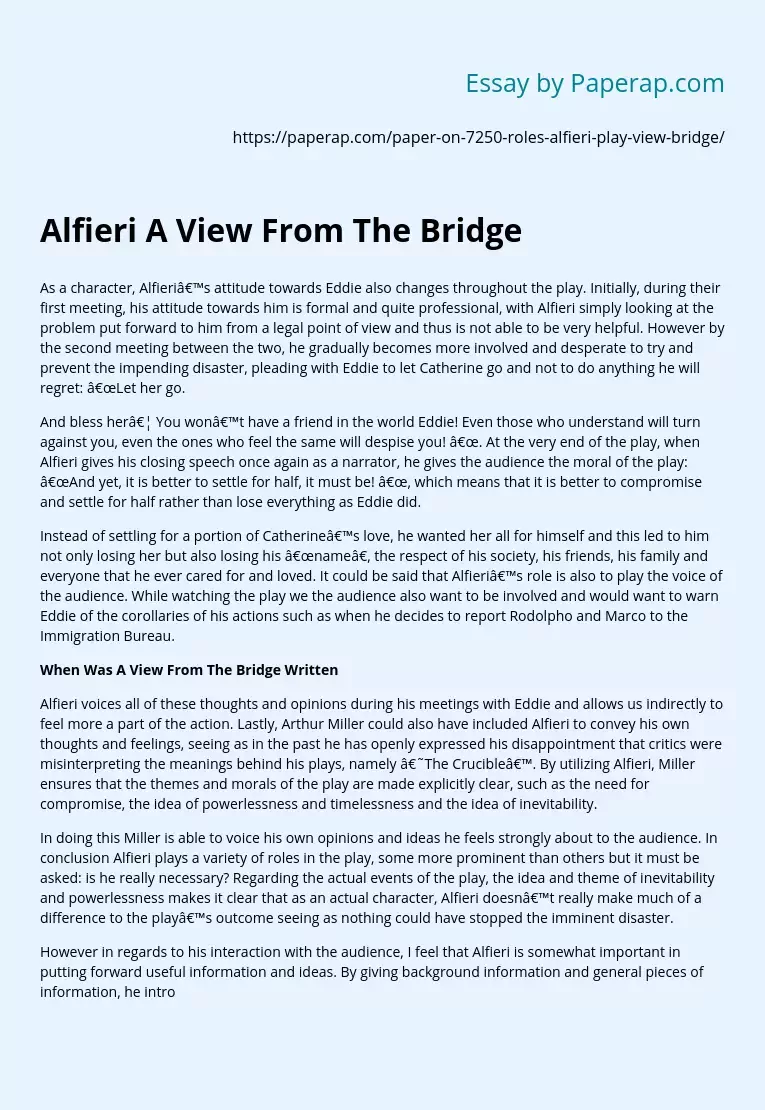Alfieri A View From The Bridge
As a character, Alfieri’s attitude towards Eddie also changes throughout the play. Initially, during their first meeting, his attitude towards him is formal and quite professional, with Alfieri simply looking at the problem put forward to him from a legal point of view and thus is not able to be very helpful. However by the second meeting between the two, he gradually becomes more involved and desperate to try and prevent the impending disaster, pleading with Eddie to let Catherine go and not to do anything he will regret: “Let her go.
And bless her… You won’t have a friend in the world Eddie! Even those who understand will turn against you, even the ones who feel the same will despise you! “. At the very end of the play, when Alfieri gives his closing speech once again as a narrator, he gives the audience the moral of the play: “And yet, it is better to settle for half, it must be! “, which means that it is better to compromise and settle for half rather than lose everything as Eddie did.
Instead of settling for a portion of Catherine’s love, he wanted her all for himself and this led to him not only losing her but also losing his “name”, the respect of his society, his friends, his family and everyone that he ever cared for and loved. It could be said that Alfieri’s role is also to play the voice of the audience. While watching the play we the audience also want to be involved and would want to warn Eddie of the corollaries of his actions such as when he decides to report Rodolpho and Marco to the Immigration Bureau.
When Was A View From The Bridge Written
Alfieri voices all of these thoughts and opinions during his meetings with Eddie and allows us indirectly to feel more a part of the action. Lastly, Arthur Miller could also have included Alfieri to convey his own thoughts and feelings, seeing as in the past he has openly expressed his disappointment that critics were misinterpreting the meanings behind his plays, namely ‘The Crucible’. By utilizing Alfieri, Miller ensures that the themes and morals of the play are made explicitly clear, such as the need for compromise, the idea of powerlessness and timelessness and the idea of inevitability.
In doing this Miller is able to voice his own opinions and ideas he feels strongly about to the audience. In conclusion Alfieri plays a variety of roles in the play, some more prominent than others but it must be asked: is he really necessary? Regarding the actual events of the play, the idea and theme of inevitability and powerlessness makes it clear that as an actual character, Alfieri doesn’t really make much of a difference to the play’s outcome seeing as nothing could have stopped the imminent disaster.
However in regards to his interaction with the audience, I feel that Alfieri is somewhat important in putting forward useful information and ideas. By giving background information and general pieces of information, he introduces and sets the mood for scenes, he brings about feelings and evokes emotion and he allows for the smooth, continuous flow of the play, which ultimately increases the viewing pleasure for the audience.
Finally, he is also important in making the audience feel more involved in the play’s action and is important to the author, who voices his ideas and feelings through him. All this combined leads to my belief that although Alfieri is not absolutely vital to the play, he is nevertheless important and definitely helps in increasing the enjoyment of watching for the audience, which is after all, the whole purpose of a play.
Alfieri A View From The Bridge. (2019, Dec 05). Retrieved from https://paperap.com/paper-on-7250-roles-alfieri-play-view-bridge/

